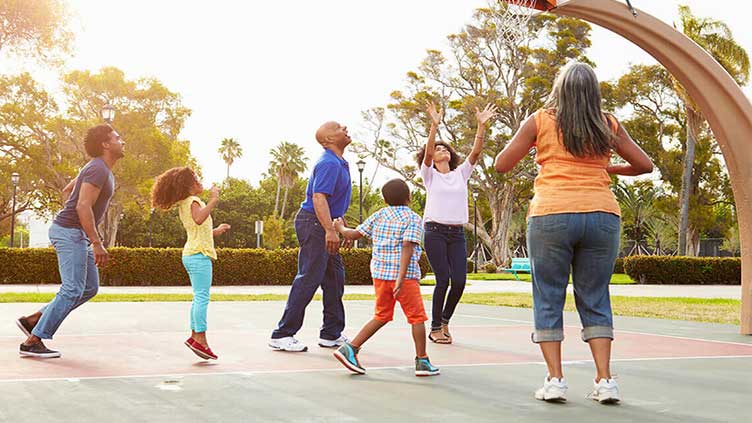Physical Activity May Lower Risk of COVID Infection, Severity

Physical Activity May Lower Risk of COVID Infection, Severity
ISLAMABAD, (Online) - New research suggests that regular physical activity can help lower the risk of COVID-19 infection and its severity, with a weekly tally of 150 minutes of moderate, or 75 minutes of vigorous, physical activity giving the best protection.
“Our findings highlight the protective effects of engaging in sufficient physical activity as a public health strategy, with potential benefits to reduce the risk of severe COVID-19,” say Antonio Garcia-Hermoso, PhD, Public University of Navarra, Pamplona, Spain, and colleagues.
"Regular physical activity seemed to be related to a lower risk of COVID-19 infection, says Garcia-Hermosa. "There is evidence that regular physical activity might contribute to a more effective immune response, providing enhanced protective immunity to infections, which could explain the relationship between exercise consistency with COVID-19 infection."
Regular exercise may also help to boost the body’s anti-inflammatory responses, as well as cardiorespiratory and muscular fitness, all of which may explain its beneficial effects on COVID-19 severity, the researchers say.
"I hope that the findings from our study give people a good reason to be physically active. Everybody can benefit from being more active, regardless of age, sex or physical ability. People who do not normally exercise should understand that all physical activity is beneficial … It can be done as part of work, sport and leisure or transport (walking, wheeling and cycling), but also through dance, play and everyday household tasks, like gardening and cleaning," Garcia-Hermosa says.
The study was published online August 22 in the British Journal of Sports Medicine.
Strong Protection From COVID?
A growing body of evidence suggests that increased physical activity may regulate the course of COVID-19 infection and reduce the risk of bad outcomes. The new analysis is the first to systematically evaluate and pool data on the effect of regular physical activity on COVID-19 outcomes.
The findings are based on data from 16 studies with over 1.8 million adults (53% women, average age 53 years).
Individuals who included regular physical activity in their weekly routine had an 11% lower risk of infection with SARS-CoV-2, the virus that causes COVID-19. ,
They also had a 36% lower risk of being hospitalized, a 44% lower risk of severe COVID-19 illness, and a 43% lower risk of dying from COVID-19 than their inactive peers.
The greatest protective effect occurs with the equivalent to 150 minutes of moderate-intensity or 75 minutes of vigorous-intensity physical activity per week, with no added benefit beyond this level.
While the study had some limitations – the analysis included observational studies and differing study designs, for instance – the researchers say their findings “may help guide physicians and healthcare policymakers in making recommendations and developing guidelines with respect to the degree of physical activity that can help reduce the risk of infectivity, hospitalization, severity and mortality of COVID-19 at both the individual and the population level, especially in high-risk patients.”
Helpful But Not a Cure-all
Sean Heffron, MD, preventative cardiologist and assistant professor of medicine at NYU Langone Health in New York City says the study “supports the well-established non-linear association of increasing physical activity with adverse outcomes from a diverse array of diseases, including infectious diseases, such as COVID-19.”
The observation is not particularly surprising, he says.
“It is as I would suspect. They compiled data from a large number of studies published over the past several years that all had consistent findings,” Heffron says.
“The take away from a public health standpoint is that being physically active improves health in myriad ways. That being said, it is not a[cure-all] , so additional measures (masking, vaccinations, etc.) are important for everyone,” he says.
Also weighing in, Joseph Herrera, DO, chair of the Department of Rehabilitation for Mount Sinai Health System in New York, says, “If you are physically fit, your body is more resilient and better prepared to handle the stressors of COVID or any other disease process.”
But for now , the question of whether physical fitness is actually protective against COVID remains unclear.
“I’m just not sure right now,” Herrera says.
He says he’s seen athletes in professional sports – including the National Football League (NFL) and Major League Baseball (MLB) – and some of them have had long COVID and have not returned to play. “These are athletes at the peak of fitness and their career.”
Nonetheless, Herrera says a good public health message in general is to stay fit or get fit.
“That’s something I preach all the time,” he says.
Garcia-Hermosa agrees. "In contrast to the vast majority of drugs, exercise is free of adverse effects. It’s time to consider exercise as medicine. It’s never too late to start being physically active."

